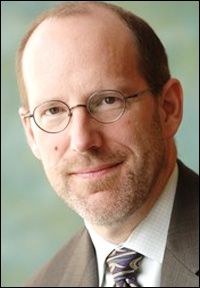‘Seoul should maximize human contact with NK’
Seoul should seek to increase interaction among businesspeople of the two Koreas, because people-to-people contact presents North Koreans with the most compelling evidence in the argument on the need for change, an American expert said Wednesday.
Marcus Noland, deputy director of the Peterson Institute for International Economics, said that despite increased economic cooperation with China, North Koreans harbor suspicions toward Chinese firms. Interaction with South Koreans on the other hand, could have a psychological impact.
“South Koreans are bigger (than North Koreans), look better fed and wear better clothes,” Noland said during an interview in Seoul. “That is going to raise questions in the heads of North Koreans.”
The South is expected to cautiously reach out to Pyongyang when the next administration conservative or liberal takes power next year in a bid to coax the regime to relent on its repressive internal behavior and halt its external provocations.
Analysts say that the expected shift is based on a calculation that in the absence of inter-Korean relations, China will increase its extraction of valuable minerals from the North unabated despite reported friction between the firms and their North Korean partners.
The expert said that Pyongyang, desperate for cash to buoy its economy but weary of foreign influence, divides economic cooperation with other countries into four categories. The best scenario, he said, involves almost no interaction with the outside, such as giving permission for airplanes to fly over the country. “Nobody knows the airplanes are there, and the money goes straight into the treasury,” he explained.
The second scenario involves laying railways and pipelines throughout the North, projects that have been pushed by the South and Russia, which would require little contact with outsiders. The third is enclaves such as the inter-Korean industrial park in Gaeseong, where interaction is strictly monitored.
The least appealing situation for the regime, Noland said, is the access now given to the Chinese firms, which are “going all around the country, trying to do deals.
“From a South Korean standpoint, that is exactly the kind of engagement you ought to be trying to aim for: creating the maximum amount of contact, encouraging competition and learning among North Korean jurisdictions.”
Noland said Pyongyang’s desire to counterbalance its reliance on China may open some doors for the South. “The regime is likely to be very sensitive” to interaction with South Korean companies, he said. “But you try to maximize the degree of that kind of contact.”
On the current state of the North’s economy, Noland said the strategy under new leader Kim Jong-un appeared to be simple: focus nearly all resources into appeasing the elite class.
In April, four months after taking the reins of the country, Kim said the people would never have to tighten their belts again, contrary to reports of a food shortage. In June, the regime handed down internal guidelines on an upcoming reform of the agricultural sector but changes have yet to be observed.
“They seem to be saying that happy days are here again but only if you are resident of Pyongyang or a member of another key group.”
The expert added that the growing divide between Pyongyang and other areas did not necessarily spell instability, though such a possibility did exist. Instead, it could lead to a rule similar to some tightly-controlled Central Asian economies.
That scenario, Noland said, would entail “an economy based on resource extraction, highly non-transparent, largely controlled by a single family, generating a small number of rich … and then a great deal of pretty poor people.
“There are lots of places in the world where there are divides between the capital, which is prospering and the hinterlands, which stagnate. It doesn’t necessarily mean there is instability,” he said. <The Korea Times/Kim Young-jin>




















































